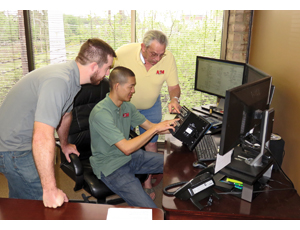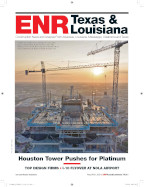
With a close-knit workforce and low-key workplace, Houston-based AIM Electrical Consultants seems to have a formula that has kept sparks flying at the firm for 18 years, even through down times.
The consultant’s 13 employees are treated like family with a relaxed dress code and flexible schedules but also profit sharing and 401Ks and robust health insurance at the financially-savvy firm. “Three percent of profits were rolled into employee 401Ks last year,” says Donn Rosen, a disabled Vietnam veteran who founded the firm after years working for very large companies that included Exxon, Bechtel and Brown and Root.
The approach seems to be working. “We’ve never had a layoff in our 18 years of operation,” says Rosen, who now is chief operating officer. Eleven-year veteran Troy Perez became president this month, succeeding Rosen.
“Firms who can provide flexible schedules and minimal dress codes will be well positioned to recruit and retain the emerging millennial workforce,” says Neil Churman, principal consultant at Morrissey Goodale, Houston. “Increasingly, employees are focused on work-life blending as a factor in choosing a job, as much as salary and benefits.”
AIM has continued profitably even through the worst recessionary years. “We posted our best year ever in 2008, and 2009 was even better,” Rosen says of the firm that has posted a profit every year since its founding.
The firm reported gross revenue totaling $3 million in 2014, up 17.8% in 2013 and projected to increase to $5.1 million in 2019.
During one rough patch, when Rosen was considering a layoff, employees voted instead for a lottery, where one person chosen randomly stayed home without pay for a week. After the second week, when Rosen stayed home, work rebounded and everyone returned to their job as usual.
Diversification has assured continued work for AIM. Its customers include 50% industrial—petro-chemical, oil & gas, steel, and paper—and 50% commercial--hospitals, wastewater treatment plants, and high rise office buildings. Repeat business totals 60%, Rosen says.
“If AIM is able to remain diversified in its end markets, it will be well positioned to ride out the next economic cycle,” Churman says.
“All of our customers from 18 years ago are still our customers today, except one client who wanted to violate the National Electrical Code,” he says. “The NEC is our bible and we will not violate it!”
In recent years, international jobs have been growing. AIM is developing an electrical distribution system for PCC Scotland at a plant in Scotland for a 30,000-ton steel forging press for pipe manufacturing and in Abuja, Nigeria, it is developing a corporate electrical distribution system. In Newfoundland, Canada, it provided analysis on Exxon’s largest offshore platform.
Brad Diehl, electrical specialist, who has worked at AIM for three years, says his salary is competitive and he is rewarded with bonuses. “We’re a pretty tight knit company with a very relaxed atmosphere,” he says. “The president provides a break room with food, drinks and snacks free to anybody and regularly brings in catered lunch,” he says.
Getting the job done is most important, Rosen says.
Employee turnover at AIM is less than 5% but the firm is not immune to raids from competitors.
“In the last five years, we lost four people when other companies made giant offers for our employees who are worth their weight in gold,” Rosen says.




Post a comment to this article
Report Abusive Comment